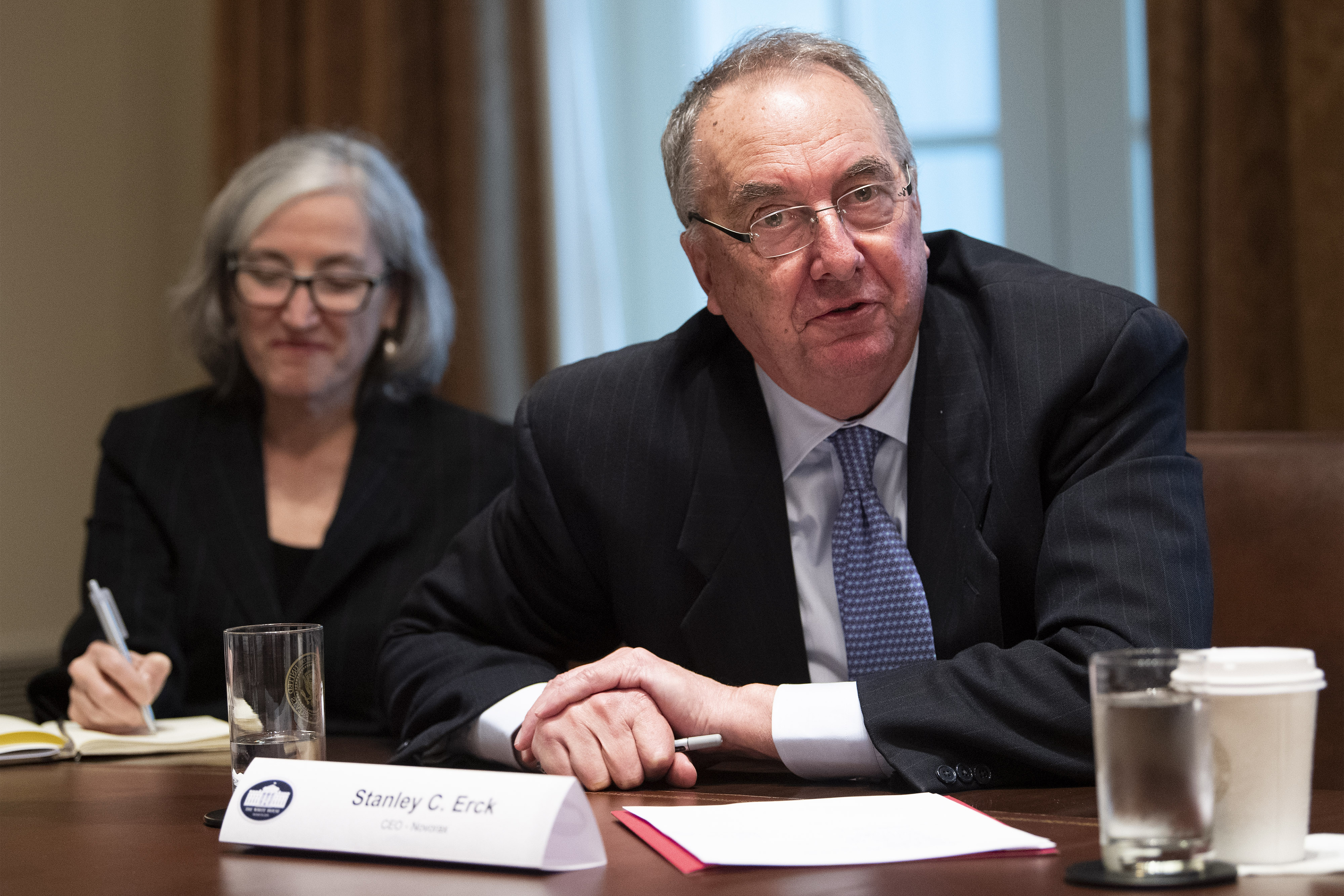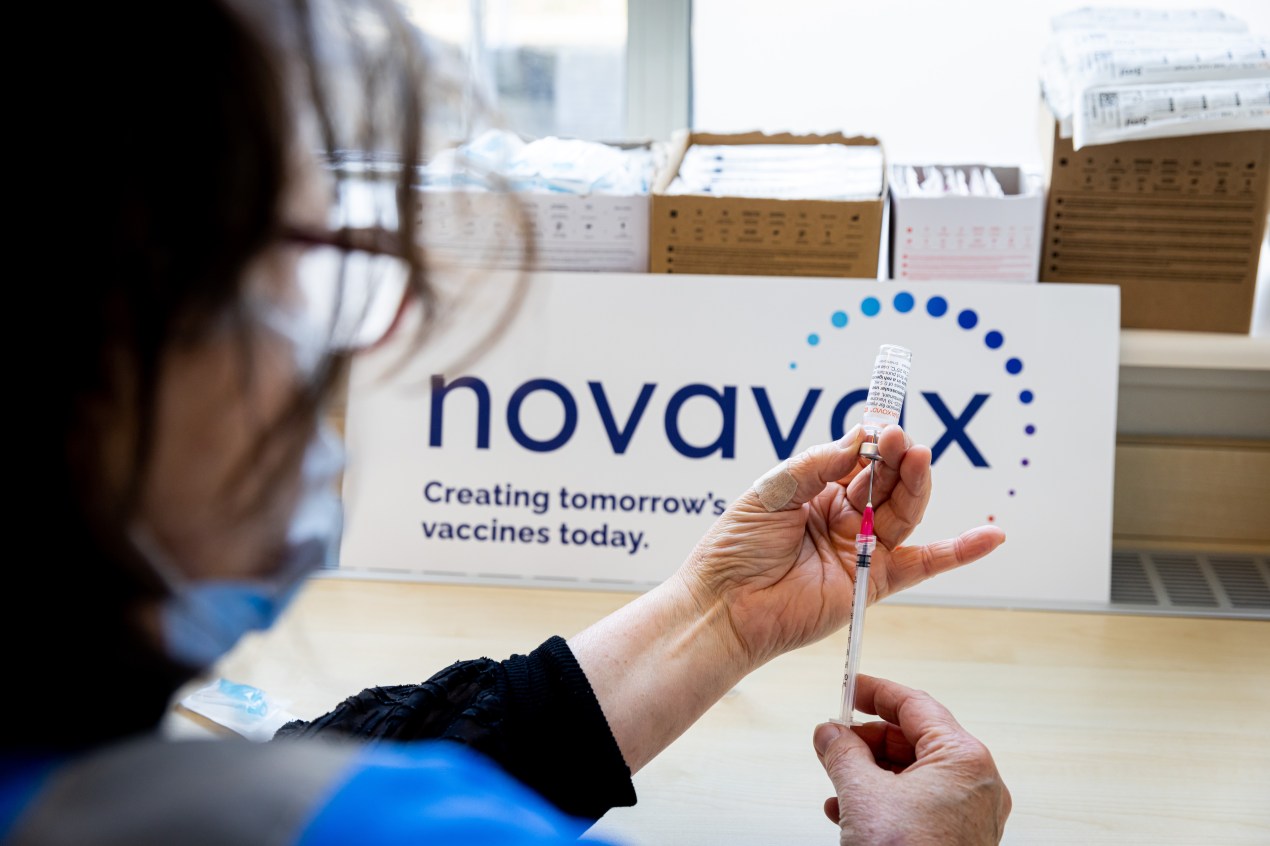Novavax hitched its wagon to the global coronavirus pandemic. Before most Americans truly grasped the scope of the danger, the small Maryland biotech startup had secured $1.6 billion in U.S. funding for its covid vaccine. Its moonshot goal: delivering 2 billion shots to the world by mid-2021.
Although the U.S. commitment eventually expanded to $1.8 billion, hardly any Novavax shots have found arms due to manufacturing issues, and most of the world has moved on. Novavax stock has plummeted from $290 a share in February 2021 to around $50 recently.
The FDA finally appears poised to authorize the company’s vaccine, however. If it does, Novavax would target the tens of millions of Americans who are not vaccinated against covid-19 or would benefit from boosters but have avoided mRNA vaccines because of health concerns or conspiracy theories about their dangers.
In clinical trials, Novavax’s two-dose vaccine has worked well and had few safety problems. It appears to cause fewer unpleasant reactions — fever, chills, and exhaustion — associated with mRNA vaccines produced by Moderna and Pfizer-BioNTech.
Novavax also relies on a more time-tested technology, using recombinant proteins grown in cell cultures. An influenza vaccine produced much the same way as Novavax’s shot has been on the market in the United States for nearly a decade.
“I do think there is a minority group who would take a protein vaccine over an mRNA vaccine,” said Dr. Kathleen Neuzil, director of the Center for Vaccine Development and Global Health at the University of Maryland. She was a researcher in a major U.S. trial of the Novavax vaccine, which found it 100% effective at preventing anything worse than mild covid.
With the FDA’s authorization, Novavax’s product would be the first vaccine produced in India for U.S. consumption. Novavax turned to the Serum Institute of India, a seasoned manufacturer that makes vaccines for poor countries, when its subcontractor in Texas, Fujifilm Diosynth Biotechnologies, stopped producing the vaccine last summer after it was dinged by FDA inspectors for inadequate contamination control, missing records, and other problems.
Founded in 1987, Novavax has never marketed a vaccine in the United States. It has boasted about the potential of a secret proprietary ingredient, Matrix-M, an immune system booster derived from Chilean soapbark trees. Those who’ve observed the company’s string of failures over the past decade see its June 7 FDA advisory committee meeting as the last chance to market its covid vaccine here, although it has obtained more than $2 billion in contracts with the U.S. government and nonprofit organizations.
Pharma giants Sanofi and GSK are jointly developing a similar vaccine. European Union reviewers began an examination of the drugmakers’ vaccine in March, and the companies expect to request an FDA review “in coming weeks,” Sanofi spokesperson Sally Bain said.
Even with FDA authorization, Novavax may be too late. While its vaccine is licensed in 41 countries and at least 42 million doses have been distributed, the world is overstocked with covid vaccine.
“They are applying for an emergency authorization” from the FDA, said Manon Cox, a vaccine industry consultant and the former CEO of Protein Sciences Corp., which made a similar vaccine. “What’s the emergency?”
Demand for covid vaccines is sluggish everywhere. About 13 million doses of the Novavax vaccine had been distributed in European Union countries as of mid-April, but fewer than 200,000 were administered. Distribution of the vaccine has been negligible since then.
Gavi, a nongovernmental organization, has suspended a 2021 agreement to buy at least 350 million Novavax doses for the COVAX program, which distributes vaccines at a deep discount to poor countries.
The U.S. market, however, shows promise for Novavax’s shot as an alternative to mRNA vaccines, especially now that the FDA has limited the use of a fourth vaccine, made by Johnson & Johnson, because of a serious though rare safety risk.
“The anti-vaxxers have been getting more and more aggressive about mRNA vaccine safety, including in recent months claiming these vaccines cause AIDS,” said John Moore, a professor of microbiology and immunology at Weill Cornell Medicine. “It’s all utter BS. But some people do buy into this garbage.”
Neuzil said the Novavax shot could prove more durable than the mRNA shots, whose capacity to prevent infection seems to fade after several months, although they are effective at keeping people out of the hospital.
“Realistically, there probably aren’t that many unvaccinated people who will now decide to take Novavax,” Moore said. “Being unvaccinated is mostly down to politics, not science, sadly.”
Most of the demand would be for boosters. But the FDA has indicated Novavax’s shots would be authorized initially as a first dose, not a booster, John Trizzino, Novavax’s chief commercial officer, told KHN in an interview. FDA officials also have bruited the possibility of requiring vaccine manufacturers to modify their shots by this fall to target the omicron variant.
Novavax has data showing its shot effectively boosts people who received mRNA vaccines, Trizzino said. And although the company is skeptical about the need to modify its shot, Novavax recently began testing an omicron-targeted vaccine and expects results in late summer, he said.
It’s surprising that Novavax should face this quandary now. The company announced May 9 that it had made its first-ever quarterly profit, of $203 million on $586 million in vaccine sales.
Novavax expects revenue of $4 billion to $5 billion this year in global sales, Trizzino said, noting “this is not just a pandemic question, it’s an ongoing vaccination question.” At an April 6 meeting, federal officials strongly suggested that covid vaccination will become an annual recommendation, like the flu shot.
“We were slightly behind providing supply into the pandemic period, unfortunately,” Trizzino said, “but there’s going to be at least some kind of annual revaccination.”
Trizzino said the company was negotiating with U.S. officials on how much of the remainder of its $1.8 billion contract would pay for shots as opposed to research. Beyond the contract, Novavax can charge the U.S. government a higher per-unit price for additional vaccine, he said.
The Biden administration’s budget contains no mention of further Novavax contracts, but if federal purchases end, Novavax could sell on the commercial market. Medicare officials have set the price for covid vaccines at about $60 per dose — approximately three times what Novavax has been getting from the U.S. and European government buyers, Trizzino said.
The company has come a long way from its first product, a microscopic fat particle designed to encase vaccines that instead was employed in skin care products and Girl Scout cookies, according to “The First Shots,” an account by journalist Brendan Borrell. Novavax spent hundreds of millions to develop a vaccine against respiratory syncytial virus, an infection that is especially harmful to babies and the elderly, but the product failed in 2016, after the company brushed aside a design feature originating in the National Institutes of Health laboratory of Dr. Barney Graham. That feature, which involves shaping the viral protein to allow the immune system to better recognize it, is now a key part of all the U.S. covid vaccines, including the Novavax shot.
In 2019, Novavax sold its vaccine production facility and laid off all but about 100 employees. A year later it was revived by Operation Warp Speed, the massive public-private effort to produce covid vaccines.
To make its shot, the company genetically alters an insect virus called a baculovirus to produce covid proteins in moth cells. The system was developed by Gale Smith, first at Protein Sciences Corp., which used it to license an influenza vaccine. Sanofi in 2017 bought Protein Sciences and its vaccine.
Smith, who has worked at Novavax since 2003, saw the moth cell system as a safer, faster alternative to traditional methods of growing vaccine viruses in eggs or monkey and dog kidney cell cultures, which were prone to contamination with potentially dangerous viruses. Baculoviruses don’t grow in people.
But the baculovirus system is messy, according to Kevin Gilligan, a senior consultant at Biologics Consulting Group in Alexandria, Virginia, and a former federal pandemic preparedness official. The product of the moth cell bioreactors can be a sticky mixture of cellular debris, and insect and viral proteins.
“It’s a whole soup of all kinds of things,” Cox said. “You go through a purification process and hopefully end up with that 90-plus percent pure protein you want.”
According to one report, some lots produced at the Texas plant were only 70% pure. So Novavax turned to the Serum Institute of India, one of several companies in the U.S., Asia, and Europe with which it had signed manufacturing agreements in 2020.
In the meantime, Novavax’s executives reaped record payouts in 2020. CEO Stanley Erck got $48 million, mostly in stocks and bonuses, while Trizzino and others got payouts of $20 million or more each. Over the past year, company executives cashed out stocks worth more than $150 million.

Shareholders have sued Novavax over sagging stock prices following missed deadlines for its vaccine.
In June 2021 Novavax hired a leading process engineer, Indresh Srivastava, from Sanofi. The company’s manufacturing problems are “well past us,” Trizzino said.
In an unusual twist, while U.S. taxpayers may come to rely on the Indian version of a vaccine they heavily funded, another Indian company, Biological E, is making a vaccine invented by Peter Hotez, Maria Elena Bottazzi, and colleagues at Baylor College of Medicine. Their only government funding was a $400,000 NIH grant, Hotez said, and Baylor is giving the shot away to companies that will make it cheaply in lower-income countries.
About 45 million doses of the vaccine have been administered so far to Indian teens — with a cost to the Indian government of $1.86 per shot.
KHN correspondent Rachana Pradhan contributed to this report.







